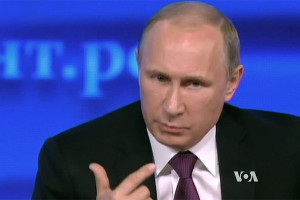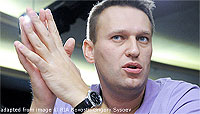Putin Accused of ‘Terror’ Against Elite by Barred Opposition

(Bloomberg – bloomberg.com – Henry Meyer, Irina Reznik – August 4, 2015)
Russian opposition leader Alexey Navalny accused President Vladimir Putin of waging a campaign of “terror” to keep the country’s elite loyal and said the government is blocking anti-Kremlin candidates from elections.
Navalny, an anti-corruption lawyer who challenged a Putin ally for Moscow mayor in 2013, said the authorities are orchestrating moves to keep the opposition off the ballot in regional polls in September. His pro-democracy coalition wants to use the vote as a springboard to gain seats in parliament next year.
“Putin doesn’t believe in elections, he believes in hanging onto power,” Navalny said Tuesday in an interview in his office in Moscow. “He’s very afraid of a split in the elite, and to ensure this doesn’t happen you have to terrorize the elite.” The opposition leader cited recent criminal charges against officials, including several linked to one who agreed to debate Navalny, as examples of Kremlin efforts to intimidate insiders.
Putin, 62, who’s led Russia for a decade and a half, is confronting the country’s first recession in six years after the price of Russia’s main export, oil, more than halved in the past 12 months. The economy has also been dragged down by U.S. and European sanctions over the conflict in Ukraine.
Near-Record Approval
Opinion polls show Putin is still riding a wave of patriotic support linked to the Ukrainian crisis, with near-record approval ratings of above 85 percent and few outward indications of tensions within the elite.
Election officials and prosecutors have denied political motivation for decisions that have blocked opposition candidates from the ballots in several regions. Putin has said his opponents suffer from low popularity, not official pressure.
Navalny, 39, said the recent filing of new criminal charges against associates of Anatoly Chubais, the architect of Russia’s privatizations in the 1990s who now heads the state nanotechnology company, was a sign that Putin won’t tolerate any breaking of ranks.
After Chubais called Navalny a “promising” politician in a televised debate in June, two of the state manager’s allies were detained for alleged embezzlement. Other associates have since fled the country. The Kremlin has banned officials and executives of state companies from giving Navalny, who has 1.3 million followers on social media, any kind of publicity, according to three people familiar with the matter.
Putin is “effectively stripping 30 percent of the population of political representation, the residents of big cities who are dissatisfied with the authorities,” Navalny said.
Criminal Probes
Candidates from Navalny’s opposition party, RPR-Parnas, are being barred from registering for Sept. 14 polls on the grounds that petition signatures were falsified. There are criminal probes against opposition organizers in Novosibirsk in Siberia and the party’s electoral chief in the Kostroma region, north-east of Moscow, is under detention.
Next year’s national parliamentary polls are likely to see a repeat of the same tactics to keep RPR-Parnas out of the lower house, the State Duma, Navalny predicted. He said he would call for a boycott of the election if opposition candidates are kept off the ballot.
RPR-Parnas is capable of winning at least 20 seats in the 450-member Duma, in which only four pro-Kremlin parties are now represented, the opposition politician said.
In his office, Navalny keeps prison photos of his brother Oleg, who was sentenced in December to 3 1/2 years in prison for allegedly defrauding the Russian branch of French cosmetics company Yves Rocher. Navalny has been given two suspended sentences, one in the Yves Rocher trial and another in a separate embezzlement case.
After leading the biggest street protests of Putin’s rule in 2011-2012, sparked by alleged fraud in parliamentary elections, Navalny finished second with 27 percent in Moscow mayoral elections in September 2013 against Kremlin-backed Sergei Sobyanin, almost forcing a run-off vote.
Threat to Legitimacy
It’s impossible to predict how long Putin, who can seek a new six-year term in 2018 elections, will stay in power, according to Navalny.
“Horribly ineffective regimes have lasted for decades in Cuba and in Zimbabwe,” he said.
What is clear is that the authorities’ decision to prevent the opposition from taking part in the elections is dangerous because it undermines credibility, according to Nikolai Petrov, a professor of political science at the Higher School of Economics in Moscow.
“This policy is very short-sighted,” Petrov said. “The main risk is that if your only source of legitimacy is one person, the leader of the country and his high popularity rating, you don’t have any factors to prop up the political system should he or his support disappear.”
Article ©2015 Bloomberg L.P. All Rights Reserved. Article also appeared at
bloomberg.com/news/articles/2015-08-04/putin-accused-of-terror-against-elites-by-blocked-opposition
[featured images are file photos]

